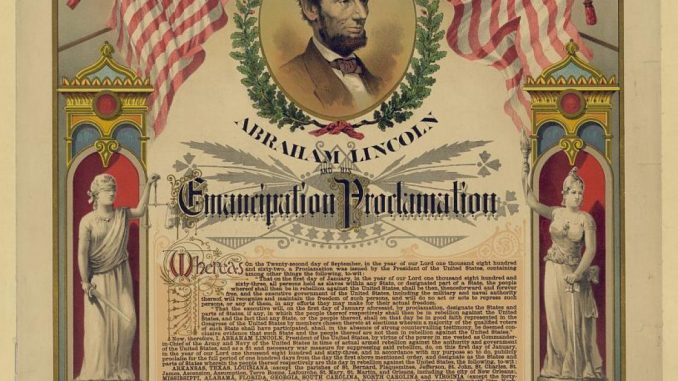
On This Day, January 1st, 1863 the Emancipation Proclamation goes into effect.
During the American Civil War, President Abraham Lincoln issues the Emancipation Proclamation, calling on the Union army to liberate all slaves in states still in rebellion as “an act of justice, warranted by the Constitution, upon military necessity.” These three million slaves were declared to be “then, thenceforward, and forever free.” The proclamation exempted the border slave states that remained in the Union at the start of the Civil War and all or parts of three Confederate states controlled by the Union army.
As a Republican politician, Lincoln had fought to isolate slavery from the new territories, not outlaw it outright, and this policy carried over into his presidency. Even after the Civil War began, Lincoln, though he privately detested slavery, moved cautiously on the emancipation issue. However, in 1862, the federal government began to realize the strategic advantages of emancipation: The liberation of slaves would weaken the Confederacy by depriving it of a major portion of its labor force, which would in turn strengthen the Union by producing an influx of manpower.
That year, Congress annulled the fugitive slave laws, prohibited slavery in the U.S. territories, and authorized Lincoln to employ freed slaves in the army. Following the major Union victory at the Battle of Antietam in September, Lincoln issued a warning of his intent to issue an Emancipation Proclamation for all states still in rebellion on New Year’s Day.
The Emancipation Proclamation transformed the Civil War from a war against secession into a war for “a new birth of freedom,” as Lincoln stated in his Gettysburg Address in 1863. This ideological change discouraged the intervention of France or England on the Confederacy’s behalf and enabled the Union to enlist the 200,000 African-American soldiers and sailors who volunteered to fight between January 1, 1863, and the conclusion of the war. In 1865, the 13th Amendment to the Constitution formally abolished slavery.
Transcript of Emancipation Proclamation (1863)
| [adrotate group=”4″] |
[adrotate banner=”24″]

[pt_view id=”517b65fj16″]



Be the first to comment